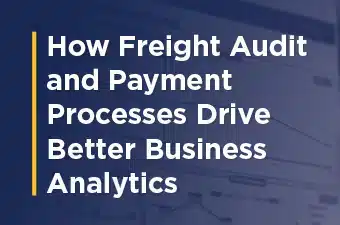Whoever said “if you want something done right, do it yourself” probably never had to audit hundreds or thousands of freight invoices on a weekly basis.
Implementing a standardized and well-managed freight invoice audit and payment process is an excellent way for you to maximize your team’s efficiency and make sure your business is paying the correct amount on every freight invoice.
DIY Freight Invoice Audit: What to Watch For
As you’re establishing your own freight invoice audit processes, there are a lot of details you’ll need to check. It’s easier to spot these if you first create a process to collect all of your invoices as they come in, categorizing them by carrier and time period so you can conduct deeper analysis when you need to. Once you’ve taken that step, you’re ready to get into each invoice.
Here’s a checklist of common items you’ll want to examine on each invoice.
- Did the carrier include all the required documentation for the invoice to be processed?
- Match freight payment terms on the invoice to the Bill of Lading (BOL).
- Ensure weight and class on the invoice matches the BOL.
- Match billing location, origin address and destination address on the invoice to the BOL.
- Ensure the PRO number on the invoice matches the carrier’s predefined format.
- Ensure the shipment received date is after the shipment pickup date.
- Check the actual shipment pickup date is within the date parameters set for that shipment.
- Make sure the BOL includes correct Purchase Order, Acknowledgement and GL coding information.
- Ensure BOL number, PO number, PRO number, etc., fit predefined formats if you require that.
- Make sure there are no duplicate invoices (check by carrier/PRO number, shipper/BOL number (outbound) and shipper/PO number (inbound)).
- Match total shipment weight to the sum of the freight detail from the invoice.
- (LTL Only) Make sure shipment class is correct for both inbound and outbound.
- Make sure the rate matches the contracted amounts (base rates, accessorials, etc.).
Keep in mind that this is by no means a complete checklist. But to know that you have accurate data flowing to the rest of the organization, you’ll need to conduct, at a minimum, every one of these checks on every invoice you receive.
Is a DIY Freight Audit Worth It?
Freight invoice audit and payment, because it is directly tied to the cash flow of your business, is a critically important business function, and for that very reason you may be contemplating whether you should insource or outsource. Here are a few questions you need to ask yourself before you decide.
- Does your team have automated workflows in place to help them execute the auditing process accurately and quickly?
- Does your team have the expertise to understand every nuance of all your carrier contracts and identify invoice errors based on those contracts?
- Do you have processes in place to not only identify invoice errors, but also to work with your carriers to repair them and eliminate future occurrences?
- Are your carriers being paid in a timely manner? (We see this happen where some shippers wonder why carriers aren’t providing great service to find out they aren’t being paid on time).
If you answered no to one or more of these questions, you may want to consider outsourcing the freight audit and payment function to a firm that specializes in this audit process. These companies are built to process and audit large numbers of transactions at high speed and determine with absolute precision if you have been invoiced the proper amount on every transaction. And, once you have the process in place, invoice data flows smoothly from your carriers, through the provider, and then to you, in a standardized format.
A Word on Invoice Error Repair
In these lists above, we’re not considering any repetitive errors you’ll want to try to eliminate so you can reduce time spent by your team on duplicate tasks. While making repairs are critical to improving your team’s long-term efficiency, communication with your team and the carriers to fix these repeated mistakes only extends the amount of time it takes for you to complete the audit process. Your carriers still expect to be paid in a timely manner, and your service (and your contract terms when renewal time comes) may suffer if you establish a bad habit of not paying your carriers on time.
The Most Important Consideration
While making sure you’re paying the right amount on every freight transportation invoice is a critical function, your freight invoice audit and payment process can and should serve a bigger purpose than delivering clean and accurate data. What will you do with that data once you have it? Will it just sit in an archive, or will it travel downstream into a business intelligence platform? Whether you choose to keep your freight audit and payment function internal or opt to outsource it, your freight transportation data can help your company do so much more than track expenses and drive Key Performance Indicators. It can also help your business leaders make well-informed decisions to produce the best possible outcomes for your company.










